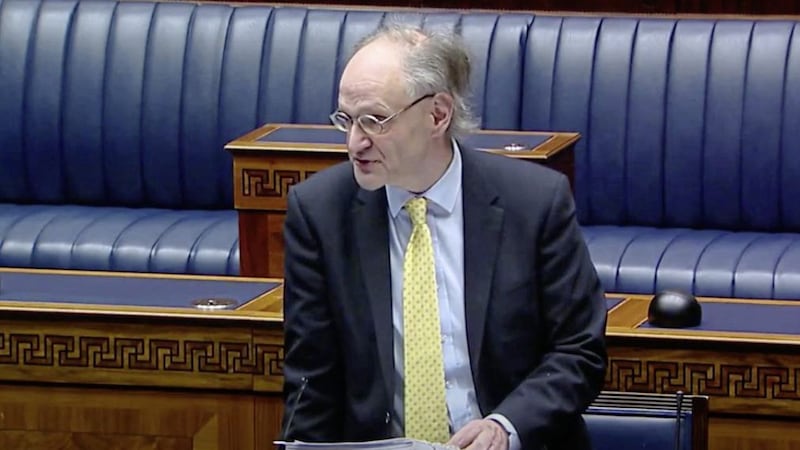Rumblings from the DUP about reopening schools faster than planned have fallen short of a full-scale executive row, proving this has been more about political positioning and internal party management than getting children back at their desks. It creates a wedge issue with the more cautious UUP and a useful distraction from the DUP’s Brexit disaster. However, the ploy depends on reopening being popular with unionist voters, which cannot be taken for granted. What polling exists on the subject shows overwhelming public support for school closures, including among working parents. What has angered parents is poor home learning provision and exam fiascos, which in Northern Ireland encompasses selection. Teaching unions and school managers may bear some responsibility for this but the DUP would need to be careful not to pass the electoral buck onto its education minister, Peter Weir. He may not be able to take the reopening decision on his own but he is ultimately responsible for every other closure problem.
**
All hail our new Brexit overlord. Following baroque court intrigues in Downing Street, David Frost has replaced Michael Gove as the UK chair of the Brexit implementation committee, including its Northern Ireland subcommittee. His EU co-chair is European Commission vice president Maros Sefcovic. Together, they are effectively the first and deputy first ministers of the sea border. Even when not haggling over the protocol, which Frost negotiated in his previous role, their haggling over the EU-UK trade deal is still decisive for Northern Ireland’s special arrangements. The working relationship between the co-chairs has already been shown to matter and Frost is promising a more assertive style. Yet this momentous change at the top has been met here with only a shrug. Despite all the hysteria over the protocol and the chin-stroking about its democratic deficit, there is clearly a deep degree of public indifference or fatalism about just having it all managed over our heads.
**
It has emerged that DUP minister Edwin Poots lobbied London last June for the same Swiss-style agricultural alignment with the EU proposed this month by Alliance, then briefly opposed last week by DUP minister Diane Dodds.
More disturbingly, it has emerged the Northern Ireland media has a shortage of Swiss puns, being overly dependent on ‘more holes than a Swiss cheese’ to cover this developing story. Countless other options are available, for example: Unionists should not Bern their bridges. Dodds does not Matterhorn. Poots has been to Helvetica and back. Arlene Foster has nowhere to Heidi. The DUP cannot Alp itself. Or canton help itself. And so on.
**
From 2015 and throughout the collapse of Stormont, Alliance expressed only one major objection to Sinn Féin proposals for an Irish Language Act - it thought bilingual signs in residential areas would entrench division. Trilingual signs everywhere, in English, Irish and Ulster-Scots, was a suggested solution.
Alliance dropped this objection last month when it supported Sinn Féin proposals for a new bilingual signage policy at Belfast City Council. However, this week Alliance refused to back an identical Sinn Féin proposal at Lisburn and Castlereagh City Council, saying it would entrench division. Alliance’s signage policy now points in two different directions. As a further mystery, there was no pressing need for the party to contradict itself: while its vote was decisive in Belfast, in Lisburn it made no difference.
**
Secretary of state Brandon Lewis has dug his heels in against Westminster funding the Troubles pension. It is “untenable” for Stormont to claim it cannot meet the cost, he said, when the executive had a £15 billion block grant this year and “they’ve had an underspend”.
Underspends are controversial because Treasury rules heavily restrict how Stormont can carry them over from year to year. Leftover cash certainly cannot be used for a regular commitment such as the Troubles pension.
But what if an exception was made? The £145 million estimated annual cost of the pension is on the order of the unspent sums Stormont has to hand back to the Treasury every year. Why could that not be used to top up a pension pot, with the block grant evening out the bumps?
It just can’t, is the answer. Rules is rules.
**
Potholes occasionally galvanise voters in the Republic, especially in rural areas. Sinn Féin is trying to bring this parish puddle politics north of the border by posting photographs of potholes and blaming SDLP infrastructure Nichola Mallon. Further online comments allege Mallon is biased towards Belfast and fancy-pants cycle paths, putting a Healy-Rae cap on the whole campaign.
Pothole repair is funded from unspent cash in the roads maintenance budget, due to its inevitable here-and-there nature, so it needs to be regularly signed off by a minister. Northern Ireland’s roads are cratered because Mallon’s Sinn Féin predecessor, Chris Hazzard, walked out with the rest of his party and left no minister in place for three years. A subsequent year of Covid budgeting has not helped - Mallon asked Sinn Féin finance minister Conor Murphy for more maintenance cash in last June’s unspent funds reallocation and did not receive a penny.
Of course, Sinn Féin might consider itself all the cannier for causing potholes then making the SDLP stand in them.









